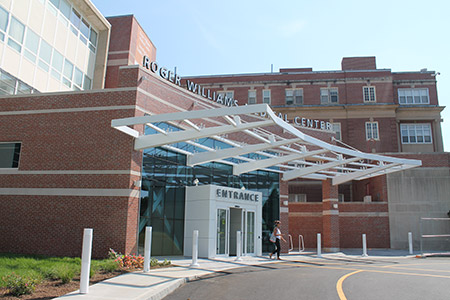
PROVIDENCE — Medication Assisted Treatment, which has gained support as the state campaigns to curb opioid abuse and overdose deaths, is now offered at Roger Williams Medical Center’s Addiction Services Center in partnership with Blue Cross & Blue Shield of Rhode Island.
MAT uses medications combined with counseling and behavioral therapies to provide a comprehensive approach to the treatment of opioid use disorder. Research shows that a combination of medication and therapy can successfully treat the disorder, and for some people MAT can help sustain recovery.
The approach is listed in the treatment part of Gov. Gina M. Raimondo’s Overdose Prevention and Intervention Task Force’s action plan, which splits its approach into four pillars: prevention, rescue, treatment and recovery.
In February, MAT was credited with a 61-percent decrease in post-incarceration deaths at the Adult Correctional Institutions.
Roger Williams plans to enroll 20-25 in the program this year, said Brett Davey, director of communications at CharterCARE, Roger Williams’ parent company.
All patients admitted to the Addiction Service Center at Roger Williams are interviewed and given a needs assessment, Davey said. During the assessment, if they are determined to be eligible for the program, it is described and offered to them. To be enrolled, a patient needs an opiate use disorder and willingness to receive physician counseling and case management services.
Roger Williams joins several medical centers now offering the treatment in the state. In November, Butler Hospital was designated as the state’s latest Center of Excellence for treating overdoses and opioid addiction using medication. The Butler program joined COEs CODAC Behavioral Healthcare, with sites in Cranston, Newport, South Kingstown and two in Providence; Community Care Alliance in Woonsocket; and Continuum, with sites in North Kingstown, Cranston and Providence.
Davey said the partnership with BCBSRI was the result of CharterCARE’s routine search for partners in fighting opioid abuse. Roger Williams was the first facilility in RI certified as a Level of Care 1 facility for treating overdose and opioid use disorders in August. The designation was granted by the Department of Health, along with the Department of Behavioral Healthcare, Developmental Disabilities, and Hospitals, to help to address the state’s addiction and overdose crisis.
“We are excited by this partnership with Blue Cross & Blue Shield of Rhode Island and are committed to working with providers, community groups, local officials, and insurers to advance the treatment and care of those with addiction disorders,” Davey said.
“BCBSRI remains committed to the Governor’s Overdose Prevention and Intervention Task Force goal, shared by legislative leaders, to increase the number of people accessing MAT each year,” said Dr. Matt Collins, vice president of clinical integration at BCBSRI.
“RWMC is excited to have partnered with BCBSRI to support patients in all stages of their recovery. We understand that patients engaged in MAT need flexibility in their treatment,” said Demetra Ouellette, president of Roger Williams Medical Center. “Our partnership with BCBSRI has allowed us to advance our programming to meet the unique needs of patients in need of MAT. We look forward to reviewing our metrics to further build on the strengths of the program and team.”
In addition to medication support, the MAT program will offer comprehensive clinical treatment to BCBSRI members. These comprehensive services include an initial clinical assessment and physician evaluation with ongoing care provided, individual and group counseling, and case management. All services are bundled into one monthly rate and would be charged in one monthly copayment for the member.
At the beginning of typical treatment, a patient might see both a physician and a counselor every week, resulting in eight co-pays for the month, Davey said. In the MAT program, the patient would only have one per month, which means potential savings of hundreds of dollars over time, since copays are generally $30-$50 per visit.
Rob Borkowksi is a PBN staff writer. Email him at Borkowski@PBN.com.












